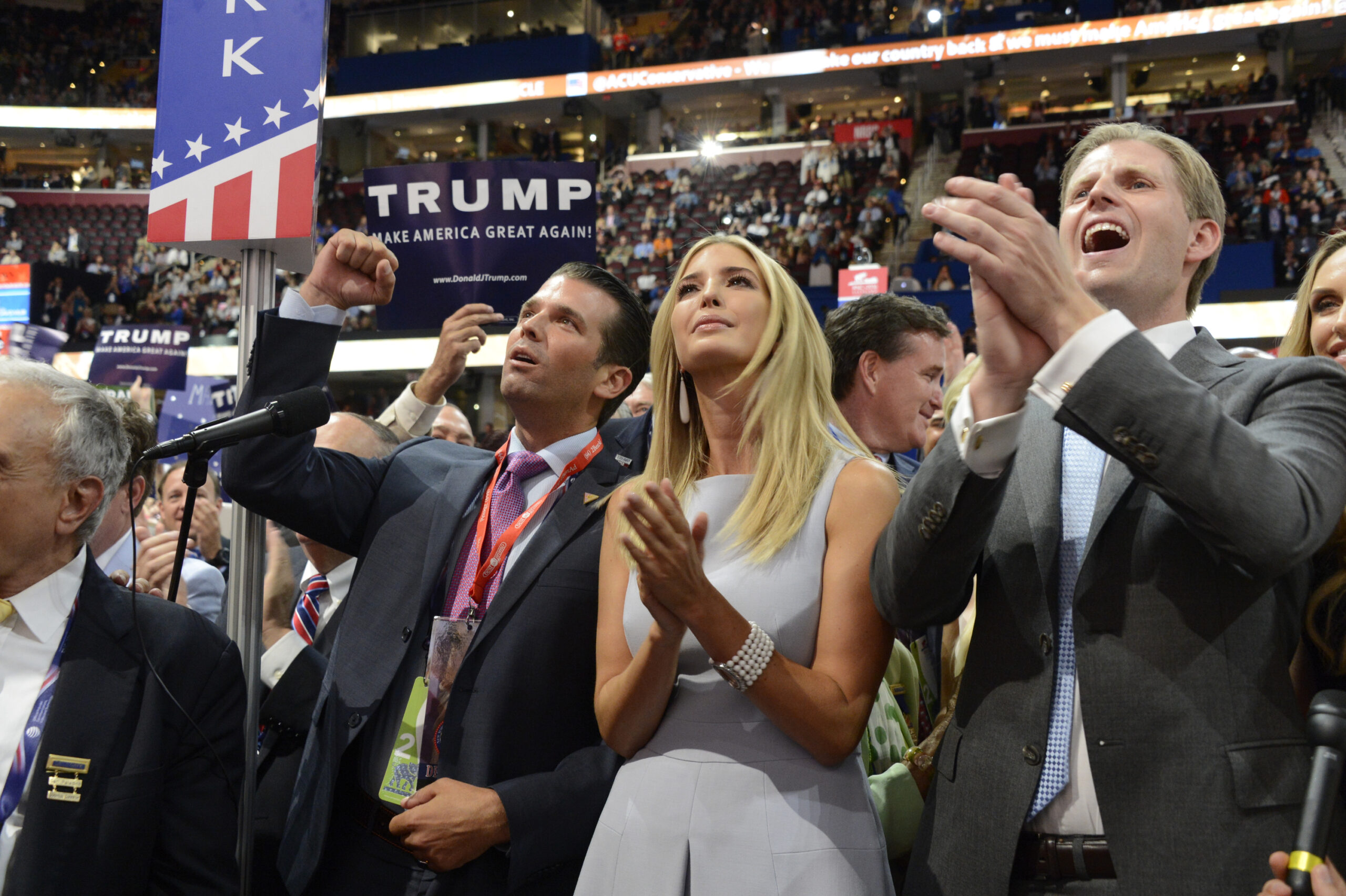The New York Attorney General’s investigation into the Trump Organization appears to be heating up yet again. The latest petition filed by the state, which was submitted on January 18th, 2022, is to compel the sworn testimony of Donald J. Trump, Donald J. Trump Jr., and Ivanka Trump, and to compel the production of documents in the possession, custody or control of Donald J. Trump.
The filing was a bit unusual in that it cited numerous and specific examples of discrepancies to support its motion.
The Attorney General’s office has demonstrated it has evidence of unusual business practices regarding its valuations for certain properties that it would like the officers of the Trump Organization to explain. Eric Trump has already appeared before the grand jury and invoked his Fifth Amendment rights, refusing to testify. Eric Trump specifically did not want to say anything about the methods and details of how valuations were made for Seven Springs, a Trump Organization property in Westchester County, New York, centered around a Georgian estate.
The Seven Springs property is a two hundred and twelve acre parcel of property that had been purchased by the Trump Organization in 1995 for $7.5 million.
It was appraised in 2000 for $25 million and again in 2006 for $30 million, both times “as-is.” But in 2007, the stated value of Seven Springs by the Trump Organization rose to $200 million, and both the 2012 and 2013 Statements of Financial Condition reported a value for Seven Springs of $291 million, asserting by then that “[t]his property is zoned for 9 luxurious homes.”
David McArdle, an appraiser at Cushman & Wakefield, assessed the twenty-four developable lots at Seven Springs at between $29.5 million and $50 million and conveyed the results to the Trump Organization in either August or September of 2014. Despite this, the 2014 Statement of Financial Condition valued seven non-existent mansions to be constructed on the property at $161 million and repeated stating the total value of the property at $291 million, not accounting for either the appraisal or the time and cost to build or sell these non-existent mansions.

All of these valuations over time were entered by Mazars, an international audit, tax and advisory firm, based on the representations of the Trump Organization, and Mazars provided documents that established that the valuation of $291 million had been specifically stated by Eric Trump during a telephone call on September 24th, 2012.
The assigned Mazars accountant stated in their work papers that Mr. Trump’s Statements of Financial Condition represent that valuations of Seven Springs were “based on an assessment made by Mr. Trump in conjunction with his associates…”
To summarize, Eric Trump, for at least three years, was personally responsible, or was following the instructions of some other family member, when stating valuations for Seven Springs that had no supporting evidence.
This total valuation of $291 million was then used to value property at Seven Springs to be set aside as a conservation easement, which resulted in a $21.1 million tax break for the Trump Organization.
This same valuation of $291 million for Seven Springs was later provided to the General Services Administration (GSA), part of the executive branch of the United States Government, as well as to Deutsche Bank, as a basis for several loans, and certified as reliable by the Trump Organization.
When completing loan applications, state property tax forms, federal tax forms, applications for insurance coverage, and applications for “other economic incentives” such as conservation easements, an applicant is supposed to use consistent, truthful values.
There is also a general prohibition against making things up for one’s financial position to look better than it is.
It’s one thing to attempt puffery for social status but doing so to acquire a loan from a commercial lender is fraud. Financial statements based on such valuations as these appear to be fraudulent on their face because the financial statements submitted to the GSA explicitly state that they were prepared under Generally Accepted Accounting Principles (GAAP) but were not.
All application processes contain a jurat statement at completion, similar to what is on Form 1040 (personal income tax return). The Form 1040 states that “Under penalties of perjury, I declare I have examined this return, including accompanying schedules and statements, and to the best of my knowledge and belief, it is true, correct and complete. Declaration of preparer (other than taxpayer) is based on all information of which preparer has any knowledge.”
You sign this when you file a return, and something similar when you fill out a loan, insurance application, or a property lease application.
Donald J. Trump would have signed his own return, and the information returns for the Trump Organization.
When you apply for a loan, negotiate your property tax valuations, or apply for economic incentives (conservation easements), you don’t get to pick the value of the property. The property has an objective value that may be an estimate or a range, but not a value with great variation.
In any event, it should be documented how the value was arrived at if it isn’t with a professional appraisal or an actual sale or purchase.
Given all this, it doesn’t seem like it will be too difficult to pin a 26 USC 7206 violation on Eric Trump for causing false tax returns to be filed.
The pertinent parts of the Internal Revenue Code § 7206 provide:
Any person who–
I.R.C. § 7206(1) Declaration Under Penalties Of Perjury —
Willfully makes and subscribes any return, statement, or other document, which contains or is verified by a written declaration that it is made under the penalties of perjury, and which he does not believe to be true and correct as to every material matter; or
I.R.C. § 7206(2) Aid Or Assistance —
Willfully aids or assists in, or procures, counsels, or advises the preparation or presentation under, or in connection with any matter arising under, the internal revenue laws, of a return, affidavit, claim, or other document, which is fraudulent or is false as to any material matter, whether or not such falsity or fraud is with the knowledge or consent of the person authorized or required to present such return, affidavit, claim, or document; or….
…and…
I.R.C. § 7206(5)(B) Withholding, Falsifying, And Destroying Records —
Receives, withholds, destroys, mutilates, or falsifies any book, document, or record, or makes any false statement, relating to the estate or financial condition of the taxpayer or other person liable in respect of the tax;
shall be guilty of a felony and, upon conviction thereof, shall be fined not more than $100,000 ($500,000 in the case of a corporation), or imprisoned not more than 3 years, or both, together with the costs of prosecution.
False tax returns also can be prosecuted using wire and mail fraud statutes, one for each incident, where a false document or return was mailed or transmitted.
Prosecutors for the State of New York and the United States also have conspiracy statutes available to them. Federal law specifies that a Klein Conspiracy exists, according to the US Department of Justice, “if two or more persons conspire … to defraud the United States, or any agency thereof in any manner or for any purpose.” 18 U.S.C. § 371 (2013).
This language is the second clause (or “defraud prong”) of the federal conspiracy statute that creates criminal liability for anyone who conspires “either to commit any offense against the United States, or to defraud the United States…”
Beyond Eric Trump, there are three other family members who have responsibility for the values entered on the financial statements, loan applications and tax returns — Donald J. Trump, Donald J. Trump Jr., and Ivanka Trump.
The Attorney General is compelling the three Trumps to testify under oath as to who determined the valuations, how the different valuations were arrived at, and why any of the valuations was used for a property for a particular purpose.
The testimony is needed because none of the three family members wrote anything down regarding the valuations — an atypical practice of any business that is not a crime family. The vendors servicing the portion of the Seven Springs property in Bedford, New York were instructed not to write anything down regarding the development project. From the subpoena:
Evidence indicates that Mr. Trump adopted a practice of preventing the creation of written records with regard to his development efforts at Seven Springs. One witness, who described his role as the “direct representative of Donald J. Trump” for the Lower Hudson Valley testified that Mr. Trump directed his activities, that he spoke to Mr. Trump personally about Seven Springs “[a]bout once a week,” and that he “seldom” communicated in writing with Mr.Trump because Mr. Trump stated to him “that he did not want things put in writing in communications between us.”
Furthermore, a tax attorney for Donald J. Trump, Sheri Dillon, “made efforts to avoid the creation of discoverable material.”
On June 18, 2015, Ms. Dillon instructed a Morgan Lewis associate to “call [Cushman appraiser] Tim [Barnes] and advise him to limit substantive emails with Scott Blakely (engineer) and instead use the phone to the extent possible (want to avoid creating discovery unnecessarily).” […] On September 28, 2015, Ms. Dillon sent an email to another Morgan Lewis associate, “Please use a fresh email when communicating with appraisers so that we avoid to the extent possible, email chains.”…In testimony before OAG, the Morgan Lewis associate testified that both emails were attempts to prevent creating documents that might be uncovered by adversaries potentially challenging the easement donation — i.e., the United States Internal Revenue Service or Department of Justice.

Donald J. Trump’s legal counsel, Alina Habba, responded to the state’s filings by claiming victimhood.
Of course, the victims “have all been closely involved” in Trump Organization transactions that, according to the Attorney General for the State of New York, “used fraudulent and misleading asset valuations on multiple properties to obtain economic benefits, including loans, insurance coverage, and tax deductions for years.”
The New York Supreme Court will return a finding that the three remaining Trump’s, Donald J. Trump, Donald Jr. and Ivanka must sit for a deposition to answer the State of New York’s questions. Donald J. Trump will have to answer truthfully or invoke his Fifth Amendment privilege.
Longtime observers of Donald J. Trump, such as Tim O’Brien of Bloomberg News and Trump’s former lawyer, Michael Cohen, have stated repeatedly that the Trump Organization is a small family-run business, and that Donald J. Trump makes all the decisions and approves every payment made by the Trump Organization.
It is also widely known that nothing is put in writing that can tie Donald J. Trump to any one decision. However, there has been discovered a spreadsheet that the Trump Organization allegedly maintained over multiple years of their unreported income. If considered valid, this could lead to a charge of conspiracy.
But Donald J. Trump may not be the only one facing specific charges.
Ivanka Trump began serving as an Executive Vice President in the Trump Organization in 2005. She left the Trump Organization in or around 2017.
While at the Trump Organization she:
direct[ed] all areas of the company’s real estate and hotel management platforms. This included active participation in all aspects of projects, “including deal evaluation, pre-development planning, financing, design, construction, sales and marketing” as well as “involve[ment] in all decisions— large and small.
Ivanka Trump was the lead negotiator for the leasehold with the General Services Administration (GSA) for the Old Post Office. As part of that process, she submitted the Trump Organization’s proposal to the GSA in July 2011. That proposal incorporated the Statement of Financial Condition of Donald J. Trump.
“Trump’s real estate investments are funded from Donald J. Trump’s significant net worth, which is composed of a wide range of capitalized affiliates. Please find Trump’s Statement of Financial Condition in an envelope submitted with each copy of this proposal.” The Trump Organization represented to the GSA that the Statement of Financial Condition was compiled under GAAP with any departures noted in the accountant’s compilation report.
While at the Trump Organization, Ivanka Trump, along with Allen Weisselberg, the Trump Organization’s Chief Financial Officer, were the primary points of contact for representatives of Deutsche Bank.
As part of an ongoing search for financing on the Doral property, she was copied on a letter from Donald J. Trump to the CEO of Deutsche Bank Securities along with which he transmitted his Statement of Financial Condition and an additional letter meant to “establish [his] brand value.”
Ivanka Trump was also deeply involved in the purchase of what eventually became the Trump National Doral Miami resort and golf course in Miami, Florida…
Ms. Trump also discussed other, less favorable terms with respect to Doral with another financial institution for financing options not personally guaranteed by Mr. Trump.
In the course of negotiating with Deutsche Bank financing for the Doral property, Ms. Trump was responsible for securing loan terms, which included a personal guaranty by Mr. Trump for which his representations regarding his financial condition would be (and were) made. Deutsche Bank then issued a loan on Doral to Trump Endeavor LLC, an entity in the Trump Organization, and personally guaranteed by Mr. Trump. This loan (initially comprised of one secured tranche and one unsecured tranche) was for a total of $125 million and closed in June 2012.
…After winning the bid to lease the Old Post Office, Ivanka Trump helped negotiate financing for the property.
The personal guaranty for this loan required submission of Mr. Trump’s Statement of Financial Condition annually, along with a compliance certificate attesting that the statement presented fairly in all material respects Mr. Trump’s financial condition.
…and in what became the Trump International Hotel and Tower Chicago.
As part of that transaction, she received term sheets from two different divisions of Deutsche Bank. Some term sheets included recourse through a personal guaranty while others did not. The final Chicago loans included a personal guaranty wherein it was represented that Mr. Trump’s June 30, 2012 Statement of Financial Condition was “true and correct in all material respects” and that the statement “presents fairly Guarantor’s financial condition as of June 30, 2012.”
And then there’s this….
Ivanka Trump’s Park Avenue Penthouse was incorporated into the valuation of the Trump Park Avenue asset on Donald J. Trump’s Statement of Financial Condition […] Ivanka Trump had an option to purchase a penthouse unit in Trump Park Avenue at $8,500,000…During the pendency of that option her unit was valued at between $12 million and $17 million higher than the option price.
Most people know having an $8.5 million option to buy something is not the same as owning it. But then adding it to the Trump Organization’s Statement of Financial Condition at $3.5 to $8.5 million more than assessed?

And Ivanka’s actions pale in scope to that of the rest of the actions of the Trump Organization.
Such an extensive paper trail over an unusually long period of time, including secret documentation by The Trump Organization itself, reinforced by the personal testimony of others involved in these processes, paints a substantial picture of a long-running tax evasion process through fraud.
This is a bountiful trail for investigators to follow and provide the most choice morsels discovered to a grand jury.
The New York State Supreme Court ought to reach a consensus ruling to enforce the subpoenas very soon. None the three members of the Trump family have any sort of special status that will prevent the subpoena from being enforced by the New York State Supreme Court. Only time will tell if any of the three will tell the truth, take the Fifth Amendment themselves, or commit perjury.

